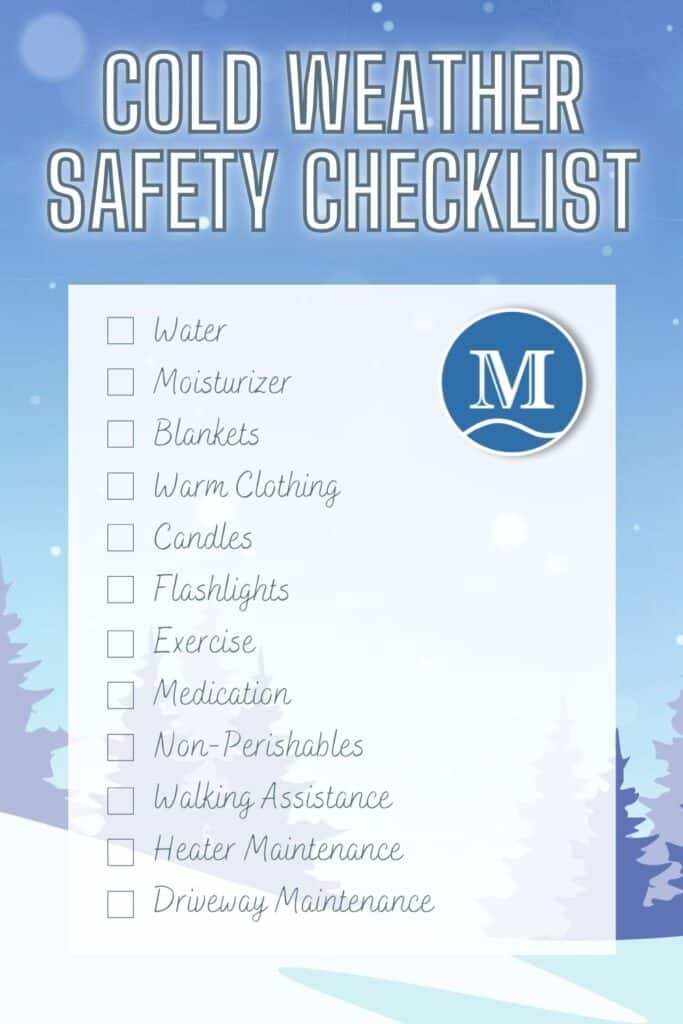Best 10 Cold Weather Health & Safety Tips For Seniors
Cold weather puts seniors and the elderly at risk of detrimental health effects. It is important to stay educated and prepared for winter. Even if there are no foreseeable storms, it is recommended to have all these things on hand and ready for use.
10 Cold Weather Health and Safety Tips
1. Moisturize
Cold air can make anyone’s skin sore and dry, but this is especially true for seniors. To avoid painful cracks and tears, start regularly moisturizing, especially after you shower or wash your hands. It also helps to install a humidifier in your bedroom and drink plenty of fluids. Although you may be staying in while the weather outside is cold, the dry air can still affect the indoors.
2. Prepare for Power Outages or Broken Heaters
If the cold weather drops to freezing temperature or lower, prepare for a power outage or broken heater. Make sure you have lots of blankets and warm clothes on hand, as well as candles, flashlights, canned food, and bottled water.
3. Take Care of Your Mental Health
Seniors and cold weather don’t always mix well, and many are at risk for depression, more than any other time of the year. No matter how cold it gets, make sure you still keep busy and active and don’t forgo exercise or social events.
4. Conduct Regular Maintenance
Turn on your heater to make sure it is in working condition. If you need any repairs or replacements, it’s better to find out now, rather than when you need it for warmth. Luckily, if you’re living in a senior community like The Mansions, regular maintenance is part of your rental agreement.
5. Care for Your Physical Well-Being
It’s always important to stretch and exercise regularly. However, staying active and flexible during the cold weather season will improve your circulation and keep you warmer.
6. Hire Help Ahead of Time for Cheaper Rates
Hire someone to keep your driveway, pathways and front steps shoveled and clear of ice, and keep a few bags of road salt on hand. By hiring someone now, you are guaranteed to be ready for the first snowfall and can often find a more competitive rate.
Another option is to look into moving into senior independent living apartments, cottages, or villas in retirement communities that take care of everything for you.
7. Stock Up on Essentials
You don’t want to be forced to go outside during a storm because you’ve run out of something important. Stock up on essential items in advance, such as food, medications, and bottled water. Consider keeping a stash of non-perishables in your kitchen or dedicated space for emergencies or late-night cravings.
8. Be Well Equipped with Winter Apparel
Be wary of cold temperatures. Make sure you have the proper gear to go outside. Invest in warm, low-heeled boots with good traction, as well as a high-quality winter coat, scarf, mittens, and a hat.
9. Be Cautious About Icy Roads or Paths
Ice is especially dangerous for seniors. If you’re going for a walk outside, remember to bring a walking stick, cane, or walker to help stay balanced. If possible, ask a friend, loved one, or caregiver to come with you.
10. Stay Educated About Serious Dangers
Be educated on the signs and symptoms of frostbite and hypothermia. Frostbite usually involves numb, waxy skin that has turned slightly grey, white, or yellow.
Hypothermia patients may feel confused, dizzy, sluggish, have an irregular heartbeat, trouble breathing, or slurred speech. If you suspect you might be suffering from hypothermia, seek medical help immediately and keep warm.
Bonus: Get Regular Weather Warnings from The Mansions
To help stay aware and prevent the harsh cold weather effects, The Mansions posts regular warnings and tips across all social media accounts. Whether you’re living in Oklahoma or Georgia, our senior living community is here to keep you informed.
Cold Weather Safety Checklist
📌 Pin, Download, and Stick it on Your Fridge!
